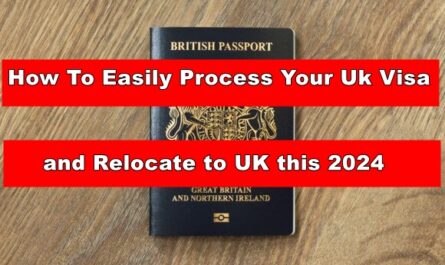Normally, becoming a British citizen has often been the envy of Immigrants.
British citizenship gives you the right to remain in the UK for the rest of your life, live, work, and study, claim benefits, apply for a British passport, and access the NHS at no cost.
With British citizenship, you can apply for a British passport and you will be free of immigration control, allowing you to travel into and out of the UK freely without the need for a visa.
So if you want to know how you can become a British Citizen, make sure you read till the end of this article.
Requirements for British citizenship
According to the British Nationality Act, a number of criteria must be met in order to gain UK citizenship through naturalization. UK Naturalisation is the process whereby a person from another country gains citizenship in the UK. These requirements are as follows (the exact requirements you need depend on the route you choose):
- be over 18
- have been in the UK for the required qualifying time. This depends on the route to citizenship you choose but is typically 3 or 5 years.
- have lived in the UK for at least 12 months after gaining settlement. This does not apply if you are applying based on your marriage, civil partnership, or relationship with a British national.
- meet the continuous residence requirements
- meet the language requirements
- be of sound mind so that you understand the step you are taking
- have passed the life in the UK test
- intend to continue living in the UK once you become a UK citizen
- be of good character
- not have breached the immigration rules
How to get UK citizenship
How you get British citizenship will depend on your circumstances and eligibility. The main ways to get UK citizenship are:
- British citizenship by naturalisation
- British citizenship by descent
- British citizenship by birth
- British citizenship by marriage
- Settled status to UK citizenship
British citizenship by naturalisation
There are two main ways to gain citizenship through naturalisation, as follows:
1. If you have indefinite leave to remain or EU Settled Status
See below ‘Settled status to British citizenship’.
2. If you are married to or the civil partner of a British citizen
See below ‘British citizenship by marriage or civil partnership’.
British citizenship by descent
British citizenship by descent means that a person who was born overseas can apply for British citizenship if their parent/s or grandparent/s had British citizenship. British citizenship by descent is typically only passed down one generation to children born outside of the UK.
This means that unlike a person who is born in the UK and has British citizenship ‘other than by descent’, a person who has ‘citizenship by descent’ cannot pass their citizenship to their children.
You may automatically be classed as a British citizen by descent if you were born outside the UK and have a parent who was a British citizen when you were born. Your parent may either have been born or adopted in the UK, gained citizenship in their own right, or worked as a Crown servant.
If you do not have automatic UK citizenship by descent, you may be able to register for citizenship by descent.
UK citizenship by birth
Not everyone born in the UK automatically becomes a UK Citizen. Whether you are a British citizen by birth depends on where and when you were born. If you were born in the UK before 1st January 1983, you will likely be classed as a British citizen by birth.
If you were born inside the UK after this date, you will likely be a British citizen by birth if at least one of your parents was a British citizen or settled in the UK when you were born.
British citizenship by marriage or civil partnership
You will be able to apply for UK citizenship based on your relationship, marriage, or civil partnership to a British citizen if you have lived in the UK for a minimum of 3 years before you apply.
The rules also state that you must not have been outside the UK during the 3 year period for more than 270 days in total (this is the absence requirement). The absence requirement is intended to ensure that applicants have not been outside the UK for too long while living in the UK, and hence they are more likely to be genuine cases.
In addition, you must not have been outside the UK for more than 90 days in the 12 months before you apply for citizenship.
Settled status to British citizenship
You can gain citizenship through naturalisation if you have resided in the UK for at least 5 years and have held one of the following for at least 1 year:
- Indefinite Leave to Remain (ILR) in the UK
- Settled Status under the EU Settlement Scheme
- Indefinite Leave to Enter the UK
You must not have been outside the UK for more than:
- 450 days in the 5-year period before applying for British citizenship
- 90 days in the 12-month period before applying for British citizenship
What documents do I need to apply for British Citizenship?
The documents you need to provide may include some or all of the following types of evidence (this list is not exhaustive):
- Proof of identity: e.g. your passport or national identity card
- Proof of permission to remain permanently in the UK (e.g. a letter from the Home Office, your Biometric Residence Permit)
- Proof of your relationship to your parent who is a British national
- Proof of your ongoing and genuine relationship with a British national
- Evidence of you meet the residence requirement (e.g. 3 or 5 years in the UK before you apply and 12 months after gaining settlement). To prove this, you can request a copy of your travel history from the Home Office showing when you have left and entered the country.
- Evidence of you meet the absence requirement. This can also be proven by providing a copy of your travel history from the Home Office showing when you have left and entered the country.
- You have passed the Life in the UK Test
- Proof of meeting the language requirements such as:
- a Home Office approved qualification in English. This must be at level B1 CEFR or higher
- a UK degree certificate
- a certificate for a degree that was taught or researched in a majority English speaking country. You will also need an Academic Qualification Level Statement (AQUALS).
- a certificate for a degree that was taught or researched in a non-majority English speaking country. In this case you will need an AQUALS and English Language Proficiency Statement (ELPS)
Submitting incorrect documents can cause delays or lead to a refusal on your UK citizenship application. Call our immigration solicitors on 0203 608 7658 for advice.
How to Apply for British citizenship
The exact process you need to follow when applying for British citizenship will depend on the exact route you are eligible for. The general application process for British citizenship is :
- Complete the British citizenship application form. The form you need to use will depend on which route you are using. You can apply for British citizenship online on the Home Office website.
- Pay the UK citizenship application fee. The amount you will need to pay depends on the route you are using.
- Make an appointment at a UKVCAS service point to provide your biometric information.
- Upload your documents to UKVI
Depending on which citizenship route you are using, you may need to provide details of two referees you have known personally for at least three years. You will need to provide a suitable personal and professional reference. The personal referee must be a British citizen or a professional person over 25 years. The professional referee must be a person with professional standing, such as a lawyer, police officer, or accountant.
If the Home Office have any questions regarding your application, they will contact you for more information. It is important to respond to any queries as quickly as possible to ensure your application is not rejected.
If your application for citizenship is approved, you will be invited to a citizenship ceremony closest to where you live.
Tests for British citizenship
The British citizenship tests are as follows:
Life in the UK Test
You will need to pass the Life in the UK test, which is designed to ensure you have a broad understanding of British history and culture. This will need to be completed at an approved test centre. There is plenty of information available online, and there are several books available that explain how to pass the test.
If you are under 18 or over 65, or you have a physical or mental condition, you may be exempt from taking the life in the UK test.
English Language Exam
To gain citizenship, you will need to meet the English language requirements, either by:
- Passing a CEFR English qualification at B1, B2, C1 or C2 level
- Holding a degree taught or researched in English
If you are under 18 or over 65, or you have a physical or mental condition, you may be exempt from meeting the English language requirement.
You will also not need to meet this requirement if you are from either one of the following countries: Antigua and Barbuda, Australia, The Bahamas, Barbados, Belize, Canada, Dominica, Grenada, Guyana, Jamaica, Malta, New Zealand, St Kitts and Nevis, St Lucia, St Vincent and the Grenadines, Trinidad and Tobago, or the USA.
UK citizenship ceremony
A UK Citizenship ceremony typically last for around two hours, and attendees are asked to come in formal wear (i.e. no jeans, shorts, or trainers).
The main part of the ceremony involves you swearing the Oath or the Affirmation of allegiance to Her Majesty the Queen and the Pledge of loyalty to the United Kingdom. This means that you promise to respect the UK’s rights, freedoms and laws.
Citizenship ceremonies are typically attended by a local dignitary (e.g. your local mayor) with whom you may be invited to have a formal photograph taken. After the UK citizenship ceremony, you will have British citizenship, and you can apply for a British passport.
Waiting for a decision on your UK Citizenship
You can expect to receive a decision on your British citizenship application within 6 months. Straightforward cases may be decided within 1 – 3 months. If your case is complex or information is missing, it may take longer than 6 months.
While waiting for a decision on your citizenship application, you can still travel in and out of the country according to your current immigration permission conditions. However, if your circumstances change you are required to inform the Home Office. Examples include if you change address, you get married, or you are arrested.
You can inform the Home Office by emailing [email protected]. If you have any questions or require an update about your application, you can contact the Home Office on 0300 790 6268.
Can you appeal a refused British citizenship application?
You can appeal a refused UK citizenship application if your decision letter states you have a right of appeal. However, not all applicants will have a right of appeal. In the unfortunate circumstances that the Home Office refuses your application, be reassured that you will still have options available in most cases. It is important to understand exactly why your application was refused. Your reasons for refusal will be explained in your decision letter.


